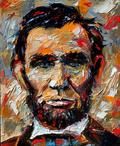Charisma
Bringing History Back to Life
Lincoln's voice, JFK's vividness, and immortalizing a vibe
Posted October 3, 2012

Despite how easily you can summon an image of Abraham Lincoln and how much information that’s known about him, we’ll never know what his voice sounded like. We’ll never have a sense of whether he was charismatic, warm, or even likeable, when all we have are other people’s descriptions of him.
Now bring to mind an image of JFK, and you can probably visualize him speaking and hear his voice. Having seen video clips of him, we perceive him as more lifelike than Lincoln.
The author Salman Rushdie relates what it means to know people from history:
"If you didn’t have a sense of how people spoke, you didn’t know them well enough...The way people spoke, in short clipped phrases or long flowing rambles, revealed so much about them: their place of origin, their social class, their temperament, whether calm or angry, warmhearted or cold-blooded, foulmouthed or polite; and, beneath their temperament, their true nature, intellectual or earthy, plainspoken or devious, and, yes, good or bad."
When we become curious about somebody, but all we know of them comes from second-hand stories and a few photos, we have a strong desire to see what they’re like in person. When applying for a job, for example, an outstanding resume is not enough to get you hired. The people doing the hiring want to get a feel for how you come across in a face-to-face interview, to see what kind of emotional vibe you give off and whether they're comfortable around you.
In less formal situations, just seeing a brief video clip of someone is usually enough to satisfy our curiosity. Millions watch and millions are paid to journalists who land the first public interview of the newest heroes and scandal-makers, such is the public’s hunger to get that first personal glimpse.
This same curiosity also applies to well-known people of the past who you’ve never seen speak, such as Henry Ford or Amelia Earhart. If you’ve already formed some impression of them from their reputation and pictures, it can be jarring to watch real footage of them for the first time. Doing this adds a whole new dimension to our impression, especially when their speech or manner defies our expectations.
Video and film technology have been recording decent footage since the 1930s, capturing many big names of the time. However, this footage remains largely forgotten today, lost beneath the billions of images recorded since then.
Here are a few other people who leave an impression if you haven’t yet seen them speak: Jackie Robinson, Mohandas Gandhi, Thomas Edison, and Albert Einstein. Audio recordings reach back even further, into the 1800s: e.g., William McKinley, Theodore Roosevelt.
Preceding these technologies, Lincoln was described by his contemporaries as a mesmerizing speaker who, despite our expectation, had an unusually high voice. Still, learning this information doesn’t spark the same kind of vivid impression you would get from seeing and hearing him.
It’s interesting to consider this: How the timing of technological advances created this historical cut-off point, between a new era where we could capture and recreate the experience of seeing someone, and a time from which these personal glimpses will forever remain inaccessible to us.


